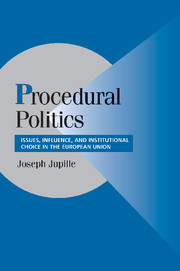Book contents
- Frontmatter
- Contents
- List of Figures
- List of Tables
- Preface and Acknowledgments
- List of Acronyms Used in the Text
- 1 INTRODUCTION: CHOICE, CONSTRAINT, AND EUROPEAN UNION INSTITUTIONS
- 2 THEORIZING PROCEDURAL POLITICS: ISSUES, INFLUENCE, AND INSTITUTIONAL CHOICE
- 3 THE EUROPEAN UNION AS A PROCEDURAL SYSTEM: RULES, PREFERENCES, AND STRATEGIC INTERACTION
- 4 PATTERNS: DETERMINANTS AND EFFECTS OF EU PROCEDURAL POLITICS
- 5 GREENING THE MARKET? PROCEDURAL POLITICS AND EU ENVIRONMENTAL POLICY
- 6 MAD COWS AND ENGLISHMEN: PROCEDURAL POLITICS AND EU AGRICULTURAL POLICY
- 7 CONCLUSION: PROCEDURAL POLITICS AND RULE GOVERNANCE IN THE EUROPEAN UNION AND BEYOND
- Bibliography
- Index
- Cambridge Cultural Social Studies
4 - PATTERNS: DETERMINANTS AND EFFECTS OF EU PROCEDURAL POLITICS
Published online by Cambridge University Press: 24 July 2009
- Frontmatter
- Contents
- List of Figures
- List of Tables
- Preface and Acknowledgments
- List of Acronyms Used in the Text
- 1 INTRODUCTION: CHOICE, CONSTRAINT, AND EUROPEAN UNION INSTITUTIONS
- 2 THEORIZING PROCEDURAL POLITICS: ISSUES, INFLUENCE, AND INSTITUTIONAL CHOICE
- 3 THE EUROPEAN UNION AS A PROCEDURAL SYSTEM: RULES, PREFERENCES, AND STRATEGIC INTERACTION
- 4 PATTERNS: DETERMINANTS AND EFFECTS OF EU PROCEDURAL POLITICS
- 5 GREENING THE MARKET? PROCEDURAL POLITICS AND EU ENVIRONMENTAL POLICY
- 6 MAD COWS AND ENGLISHMEN: PROCEDURAL POLITICS AND EU AGRICULTURAL POLICY
- 7 CONCLUSION: PROCEDURAL POLITICS AND RULE GOVERNANCE IN THE EUROPEAN UNION AND BEYOND
- Bibliography
- Index
- Cambridge Cultural Social Studies
Summary
This chapter begins the empirical assessment of procedural politics in the European Union. Because this topic has never been treated systematically, one of the goals of this chapter is to paint a picture of the general incidence of procedural politics, including the extent to which it occurs; the time periods, actors, and issues involved; and its effects on important outcomes. The focus throughout will be on the directly observable manifestation of procedural politics, in the form of procedural political disputes (disagreements by two or more actors over which procedure should be used in adopting legislation). Beyond the descriptive task, I seek to test specific theoretical predictions from Chapter 2, based in part upon the analysis and operationalizations developed in the last chapter. Accordingly, this chapter begins with a descriptive examination of variations in procedural politics across time, actors, and issues. These descriptive statistics will provide first-cut assessment of some of the theoretical expectations developed in Chapter 2. Next, I test the general argument about the conditions under which procedural politics is said to occur, namely, as a function of opportunity (the availability of procedural alternatives through jurisdictional ambiguity) and incentives (influence differences among alternative procedures). These tests focus exclusively on the 1987–1997 period, for which an original dataset has been constructed. Armed with these positive results, I then consider some specific effects of procedural politics, showing them to be theoretically consistent and important both in everyday politics and in terms of the long-run evolution of EU institutions.
- Type
- Chapter
- Information
- Procedural PoliticsIssues, Influence, and Institutional Choice in the European Union, pp. 82 - 126Publisher: Cambridge University PressPrint publication year: 2004



